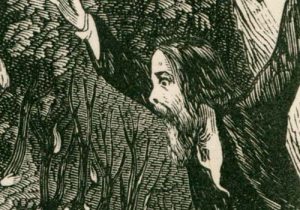In this important early letter to Ashbel Green in Philadelphia, Presbyterian minister William Hill criticized the state of the revivals in the southern backcountry. Hill relayed an unsettling report from North Carolina colleague James Hall that the “bodily agitations” attending religious gatherings had recently taken on “entirely new appearances,” especially in east Tennessee. His letter demonstrates how revival news circulated through ministerial epistolary networks; it also includes one of the few surviving descriptions of the peculiar “shooting” or “dueling” exercise. Conjectural readings and textual defects appear in square brackets.
Winchester, January 20th 1804
Reverend & Dear Sir,
As a very favourable opportunity offers itself by my friend Dr. Annin, I am induced to drop you a line. I should feel more cheerful in doing this if I could convey to you some very agreeable intelligence respecting our Zion. Immediately in our parts we have nothing worth communicating. In the Counties of Prince Edward & Charlotte but especially the latter religion is considerably prosperous. I visited those places last fall, & was never more pleased with appearances there altho’ my native place & formerly the seat of a considerable revival of religion in Dr. John Smith. The impressions there are intirely free from bodily agitations or any unusual appearances, & seem as rational & as scriptural as I have ever seen, & what is a little unusual, many of the most respectable & best informed persons are the subjects of the work. I wish I could say as much in favour of the accounts I have received from North Carolina & Tennessee States. But they have become so frantic & extravagant, I know not what to think. I have these accounts from authentic sources [a] good part of which I got from our good friend Mr. Hall. The work has assumed many & entirely new appearances of late, all of the most extraordinary kind. They have now the dancing exercise, the Jerking, exercise, the running exercise, the standing exercise, & even the shooting exercise; the last has appeared in Tennessee & resembles duelling more than anything else. Were I to describe particularly all those difference exercises, & more that might be mentioned, you might think I exagerated, in this way I received the first accounts of these things, but I now receive them as facts. I am afraid what I believe was a gracious visitation from heaven in the first instance will be brought into disgrace by these extravagances, & the Clergy were so rejoiced at the appearances of a revival, that I fear they think themselves bound to vindicate the work in toto, & are afraid to oppose the merest frensies, for fear of fighting against God.
But Sir I have another subject yet to mention which gives me great uneasiness. This respects the President of Princeton College. There is a fama clamosa in this country generally prevailing that in his Lectures on moral philosophy to his Students, he undertakes to prove that Polygamy & concubenage are not moral evils, & that they are only evils at all when they violate the statute laws of the land. I did not believe this at first but upon inquiring from several young Gentlemen of intelligence & veracity in these parts who were lately his pupils, they declare these to be his sentiments. This being the case there is nothing more necessary but to convene a few more of our innovating Legislators that Dr. Smith is right, & these old laws, the remnants of darker days will soon be repealed & the consequences are awful to think of. At any rate it would not do to employ a pupil of Dr. Smith as a missionary to the Indians where the Doctor’s plan may be practised upon without violated either the Laws of God or Man. If these things are so, & are not checked, I will venture to predict that very few students will attend Princeton hereafter from these parts & the few that will attend will be of most profligate kind. My being very slightly acquainted with Dr. Smith, [is] the reason why I trouble you with these remarks. But I think they are not improperly addressed to you as a Trustee of that Seminary. If the Trustees do not interfere in this business, I think it very probable the General Assembly will.
I should be glad of a line from you upon this subject by Dr. Annin. I am
Dear Sir yours respectfully
Source
William Hill to Ashbel Green, January 20, 1804, box 10, Princeton University Library Collection of Ashbel Green Materials (C0257), Manuscripts Division, Department of Rare Books and Special Collections, Princeton University Library, Princeton, N.J.
